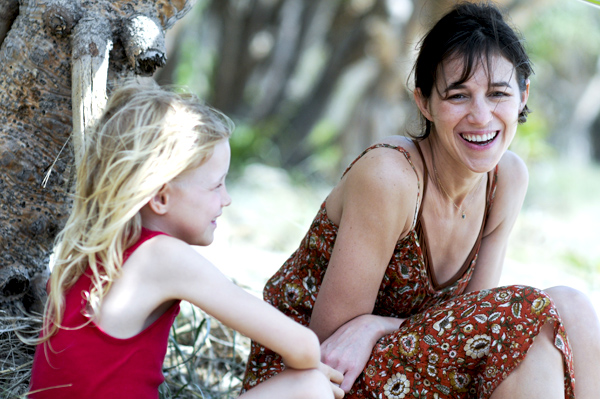|
Reviews of Recent Independent, Foreign, & Documentary Films in Theaters and DVD/Home Video

THE TREE Remember the out-of-nowhere deluge of frogs that pelted the San Fernando Valley in Paul Thomas Anderson’s Magnolia? Though The Tree doesn’t offer anything quite as fantastical, it nevertheless features a strike by nature of Biblical proportions. An enormous and encroaching tree, uninvited yet benign amphibians, and the capriciousness of fortune all plague a working-class family out in the boonies of Queensland, Australia. Strapping and only in his thirties, Peter O’Neil (Aden Young) dies of a sudden heart attack while driving his pick-up truck towards home. The vehicle gently rolls down the driveway, intercepted by the gigantic fig tree (a Moreton Bay, to be exact) that looms like a canopy over his family’s home, which is barely holding together on stilts as it is. For months following Peter’s death, widowed Dawn (Charlotte Gainsbourg) neglects the house, with corroded plates left in the sink and wilted flowers in the living room. (The home could be the dilapidated antithesis to the idyllic and prettified Australian homestead in 2009’s The Boys Are Back.) She sleeps until eleven, letting her four kids run riot so that eight-year-old Simone (Morgana Davies) becomes more of a caretaker than her mum. Preternaturally serious and judgmental, she was with her father when he died, and would suffer no fool gladly should one assume that she wasn’t his favorite. Independent of each other, Dawn, middle son Lou, and, more pointedly, Simone each commune in their own way with the deceased Peter through the fig tree, using it as a conduit to him. After months of living in a stupor, Dawn looks for work and lands the first job she seeks, bookkeeping for plumbing supplier George (Marton Csokas). Both are attractive, about the same age, shy, and awkward—the script takes its time in prodding them toward each other. For Simone, George is nothing more than an interloper, and she refuses to spend the Christmas holiday with him. He remains steadfast, though, not buckling under her penetrating stare, which, honestly, would give any adult pause. Because of the modest setting and story, gestures, such as erasing an outgoing message that contains Peter’s voice, reverberate louder than they would otherwise. As if in a retort to the simplicity of Julie Bertuccelli’s direction and the mundane setting, a special effect-laden climax delivers a whooping meteorological (and metaphorical) maelstrom that takes the film temporarily from kitchen sink to disaster drama. Is the tone sentimental? Yes, but only as much as the material requires—no insulin is necessary. The beauty of the film lies in the contradictory nature of the family. I was afraid that Simone would be yet another wise-beyond-her-years kid. (She advises a friend, “You have a choice to be happy or sad, and I chose to be happy, and I am happy”). But what makes her content may not be what’s best for everyone in her family, especially her mother, in the long run. One of the highlights of moviegoing is when an actor jumps out at you, one that was below your radar or now seen in a new light. In this case, the discovery is lanky New Zealand-born actor Marton Csokas, who has had a prolific career, from TV’s Xena: Warrior Princess to last year’s Alice in Wonderland. He oozes with vulnerability, and you have no doubt what he’s thinking. This macho guy with a big heart takes the focus away from the O’Neil clan whenever he’s onscreen, and considering the competition from Morgana Davies, that’s saying something. (If this film was produced 30 years ago, Bryan Brown would have played his role.) Gainsbourg
worked on this film shortly after her grieving
mother-turned-sexed-up-banshee role in
Antichrist, where she was a willing and gutsy puppet for Lars
von Trier. (That film’s warning, “Chaos reigns,” might also apply to
The Tree in a more understated way.) Bertuccelli’s approach to
Gainsbourg differs from von Trier’s (no revelation there). She
sensitively handles the fluid family dynamics almost as acutely as she
did in her
sharply observed feature debut and family drama
Since Otar Left… (2003). Still, Gainsbourg brings a ferocity to
her performance (though without going batty) when Dawn perceives her
family is being judged or under attack while retaining a reserve in her
scenes with Csokas.
Though she
may have won the best actress award for Antichrist at Cannes,
she proves
here that less is more.
Kent Turner
|

